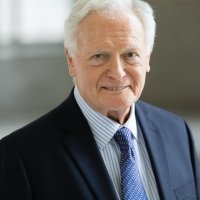Celebrating the Legacy of Daniel Patrick Moynihan: The Launch of "Moynihan's Moment," a New Book by Gil Troy
On November 10, 1975, the General Assembly of United Nations passed Resolution 3379, which declared Zionism a form of racism. Afterward, a tall man with long, graying hair, horned-rim glasses, and a bowtie stood to speak. He pronounced his words with the rounded tones of a Harvard academic, but his voice shook with outrage: "The United States rises to declare, before the General Assembly of the United Nations, and before the world, that it does not acknowledge, it will not abide by, it will never acquiesce in this infamous act."
This speech made Daniel Patrick Moynihan, the U.S. ambassador to the United Nations, a celebrity, but as McGill University Professor of History Gil Troy explores in his latest book, Moynihan's Moment: America's Fight Against Zionism as Racism, it also marked the rise of neo-conservatism in American politics--the start of a more confrontational, national-interest-driven foreign policy that turned away from Kissinger's détente-driven approach to the Soviet Union--which was behind Resolution 3379. Moynihan recognized the resolution for what it was: an attack on Israel and a totalitarian assault against democracy, motivated by anti-Semitism and anti-Americanism. While Washington distanced itself from Moynihan, the public responded enthusiastically: American Jews rallied in support of Israel. Civil rights leaders cheered. The speech cost Moynihan his job--but soon won him a U.S. Senate seat. Troy examines the events leading up to the resolution, vividly recounts Moynihan's speech, and traces its impact in intellectual circles, policy making, international relations, and electoral politics in the ensuing decades.
The mid-1970s represent a low-water mark of American self-confidence, as the country, mired in an economic slump, struggled with the legacy of Watergate and the humiliation of Vietnam. Moynihan's Moment sheds new light on a turning point, when the rhetoric began to change and a more muscular foreign policy began to find expression, a policy that continues to shape international relations to this day.
Joining Troy on the panel is Maura Moynihan, daughter of Senator Daniel Patrick Moynihan; Stephen Hess, senior felllow emeritus at the Brookings Institution; and Steven R. Weisman, editorial director and research fellow at the Peterson Institute for International Economics.
Wilson Center Senior Scholar Samuel F. Wells will chair the event.
Visit Amazon.com to purchase the book.
Speakers

Former Deputy and Associate Director, Woodrow Wilson Center; Former Director, West European Studies Program, Woodrow Wilson Center
Hosted By

History and Public Policy Program
A leader in making key foreign policy records accessible and fostering informed scholarship, analysis, and discussion on international affairs, past and present. Read more


Cold War International History Project
The Cold War International History Project supports the full and prompt release of historical materials by governments on all sides of the Cold War. Read more
